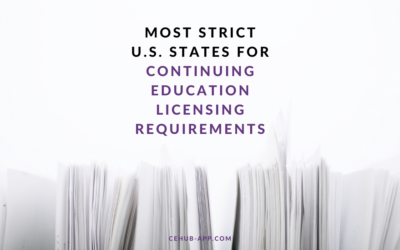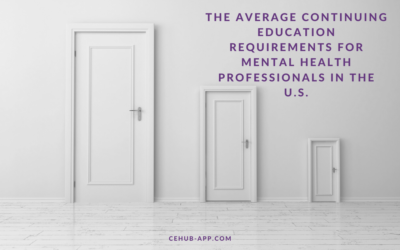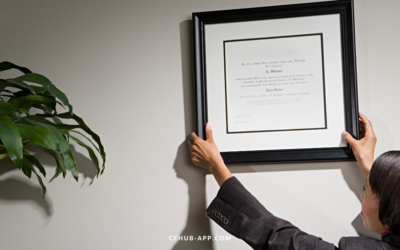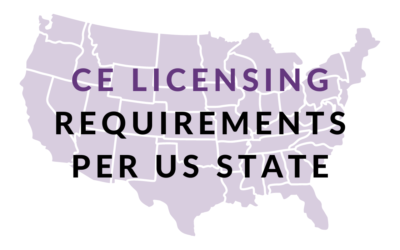Each state certainly has their own unique continuing education requirements. The variance can be in the number of hours required, the renewal cycles, what constitutes an approved course or program, how many hours can be from distance learning, and more. So far, we’ve covered the following topics we feel will interest you:
The Most Lenient Continuing Education Certificate Requirements for Mental Health Professionals
The Average Continuing Education Requirements for Mental Health Professionals
The Most Commonly Required CE Topics for Mental Health Professionals
Though there is a lot of variety around the United States, there are also commonalities among states. There are always outliers, but let’s dive into the most common continuing education requirements for psychologists, marriage and family therapists, licensed clinical social workers, and licensed professional counselors.
Psychologists
Psychologists tend to typically be held to the strictest expectations of all of the mental health professionals (though, that isn’t true in every state), but when you look at the continuing education requirements throughout the country, psychologists don’t actually seem to differ all that much from other types of licensees.
Most commonly, psychologists are expected to complete 40 hours of continuing education every two years. In fact, of all the 50 states (plus Washington D.C.), 23 share the 40-hour continuing education requirement every two years. The next most common requirement is a tie between 24 hours every two years and 30 hours every two, with 5 states sharing those requirements.
States that share the 40-hour continuing education requirements are:
Alaska, Arizona, Colorado, Delaware, Florida, Georgia, Indiana, Iowa, Louisiana, Maine, Maryland, Minnesota, Missouri, Montana, New Hampshire, New Jersey, New Mexico, North Dakota, Oregon, South Dakota, Tennessee, Texas, and Wisconsin.
Marriage and Family Therapists
Just as is true with psychologists, the most common continuing education requirement for marriage and family therapists (MFTs) is 40 hours every two years. There are a total of 20 states that share the 40-hour requirement for MFTs. The next most common for MFTs is 30 hours every two years, with nine states sharing that expectation.
States that share the 40-hour continuing education requirements are:
Alabama, Colorado, Delaware, Idaho, Indiana, Iowa, Kansas, Louisiana, Maryland, Minnesota, Missouri, Nevada, New Hampshire, New Jersey, New Mexico, Oregon, Rhode Island, South Carolina, South Dakota, and Utah.
Licensed Clinical Social Workers
Licensed clinical social workers (LCSWs) tend to have more similar continuing education requirements to their MFT and licensed professional counselor colleagues, but of course, there is still quite a bit of variety. For LCSWs, the most common hour-requirement is actually 30 hours every two years, with 16 states sharing that requirement. The 40-hour requirement is still close, with 15 states requiring 40 hours.
States that share the 30-hour continuing education requirements are:
Alabama, Arizona, Arkansas, Florida, Illinois, Kentucky, Missouri, New Mexico, North Dakota, Ohio, Pennsylvania, Rhode Island, South Dakota, Texas, Virginia, and Wisconsin.
Licensed Professional Counselors
While LCSWs, MFTs and licensed professional counselors (LPCs) tend to share similar requirements from state to state, LPCs might surprise you with their most common continuing education requirement overall. Just like psychologists, LPCs have a total of 23 states that require 40 hours of continuing education every two years. Their next most common requirement is 30 hours every two years, with nine states sharing that requirement.
States that share the 40-hour continuing education requirements are:
Alabama, Alaska, Colorado, Delaware, Idaho, Indiana, Iowa, Louisiana, Maryland, Minnesota, Missouri, Nevada, New Hampshire, New Jersey, New Mexico, North Carolina, Oregon, Rhode Island, South Carolina, South Dakota, Utah, Vermont, and Washington D.C.
Conclusion
Across all of the different license types, the most common continuing education requirement for mental health professionals is 40 hours every two years. That said, there is a lot of variety within license types across all of the states, so assuming your state shares the 40-hour requirement will only leave you right less than 50% of the time. Still, it’s interesting to see such a high level of commonality!
Disclaimer: this data is a collection of the most common requirements. It should not be used as a guide for you to follow as your state’s requirements may be an outlier. It is always best to check your governing agency’s website for the most accurate, up-to-date, information for your license.
















